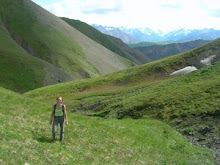I recently read "The Hours" by Michael Cunningham. (It's been suggested to me before and I'm fairly fond of the movie, but it's still taken me this long to remember that i want to read it.) Of course I had to read it in the context of having already seen the movie (I prefer to do it the other way around), but I still enjoyed it far more than I expected to. Cunningham's writing is sensory, encompassing sight, sound, smell, taste , and texture, but generally not in an offensive or distracting way. It's more like what your own interior monologue would sound like if you were being particularly observant and had a poetic bent. I liked his descriptions of people's motivations as well, the ways in which he told us why people where acting as they were and also giving us insight into how they related with the other characters. It was very omniscient narrating.
"Richard cannot imagine a life more interesting and worthwhile than those being lived by his acquaintances and himself, and for that reason one often feels exalted, expanded, in his presence. He is not one of those egotists who miniaturize others. He is the opposite kind of egotists, driven by grandiosity rather than greed, and if he insists on a version of you that is funnier, stranger, more eccentric and profound than you suspect yourself to be... it is all but impossible not to believe, at least in his presence and for a while after you've left him, that he alone sees through to your essence, weighs your true qualities... and appreciates you more fully than anyone else ever has. It is only after knowing him for some time that you begin to realize you are, to him, an essentially fictional character, one he has invested with nearly limitless capacities for tragedy and comedy because he, Richard, needs to live in a world peopled by extreme and commanding figures."
The book and the movie center around three women from different times and their intertwined-ness, most graphically illustrated by their relationships to Virginia Woolf's "Mrs. Dalloway." (I haven't read "Mrs. Dalloway" or I'm sure I would have much more insightful things to say about this particular aspect of the book.) Each woman, in the course of her story, experiences a kiss that is somehow pivotal to what she is feeling. Virginia Woolf kisses her sister, Vanessa; Laura Brown kisses her neighbor, Kitty; Clarissa Vaughan kisses her closest friend and past lover, Richard. (Actually, I'm not sure that happens in the movie. I remember a kiss with her long-time partner, Sally, but I can't recall if she kisses Richard or not, or whether it's framed as inportant.) What I thought was interesting was how different these events were in the book, and what a different feel they had to them. Particularly, I'm think of the Virginia-Vanessa kiss; in the movie, I was shocked by the awkward and uncomfortable seemingly out-of-nowhere kiss. I felt that the kiss abrupty broke up the continuity of action, that it was so out of place that everything before it had to come to a stop and the narrative had to take a different direction. Even though the kiss in the book is framed as unusual for the two, it is not a breaking of what has come before, just an outgrowth of it. It is a postive action, not a negative disturbance.
"...Although it is not at all their custom, Virginia leans forward and kisses Vanessa on the mouth. It is an innocent kiss, innocent enough, but just now, in the kitchen, behind Nelly's back, it feels like the most delicious and forbidden of pleasures. Vanessa returns the kiss."
Basically, what I liked about the book was that I finally felt like I understood character motivation and the connections between the three women. There was just so much more clarity. Now I want to see the movie again, to see if it resonates differently with me.
Subscribe to:
Post Comments (Atom)







3 comments:
Ooh, you should definitely read Mrs. Dalloway. It's quite excellent. And the structure and style of The Hours is sort of an homage to the book.
Btw, I read The Hours before I saw the movie, and I really did not like the movie. I thought what was poetic and literary in the book seemed clunky and heavy-handed when translated to the screen. But part of that could have been due to the repetitiveness of the Philip Glass score, which I didn't think really worked for the film.
ooh, i'm excited to read it now! i remember feeling sort of ambivalent about the movie, but i should definitely give the book a chance.
Yeah, I would definitely recommend it! I liked the movie okay (I saw it a second time in Poland, and I think I was just exhausted and had some sort of epiphany but I've never been able to quite recover it), but I really loved the book. I'm amazed at how, with very few plot differences, it could be such a different experience. I totally agree with raquel about the clunky/poetic disconnect.
Post a Comment